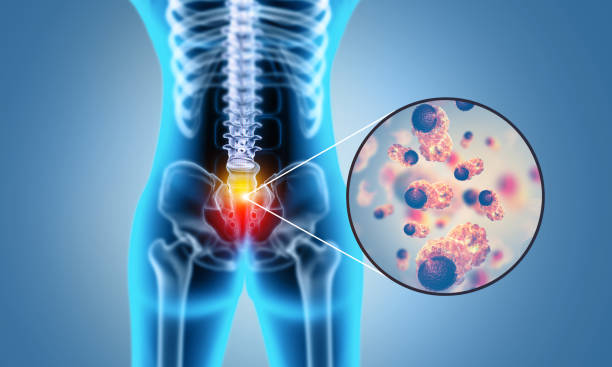Treatment for degenerative disk disease

Degenerative disk disease (DDD) is an illness that affects the disks within your spine. These disks act as cushions between the vertebrae and when they become damaged or worn down, they may cause pain or other complications. Although there isn't a cure for DDD but there are treatment options which can improve your life quality. In this blog post, we will discuss the many options for treatment for DDD that include surgery as well as non-surgical methods. We will also discuss how you can manage your symptoms and live in a healthy way despite the disorder. If you suffer from DDD and want to know more, read on and we've got some great advice for you!
What's degenerative disk disease and what are the symptoms
Degenerative disk disease is a condition that is characterized by the degeneration of the disks which cushion vertebrae in your spine. It is believed that the disks can be designed to bear shocks and protect spine vertebrae to prevent wear and tear. However, over time they begin to degrade and become less effective at cushioning the spine. This could cause stiffness, pain and other symptoms. degenerative disk disease is often due to aging as well as repetitive movements. However, it can also be caused by injury or infections. degenerative disk disease is usually treated with conservative treatments like treatment with rest, ice or heat in addition to physical therapy. In certain situations, chiropractic treatment or surgery may be required. degenerative disk disease can be a painful and debilitating condition. However, with proper treatment, most people can manage their symptoms and live the normal life.
How can it be treated - surgery or non-surgical techniques
Degenerative disk disease is one of the most frequently occurring degenerative spine conditions. It is a condition that occurs when the disks which cushion the vertebrae within the spine begin to break down, which causes pain and stiffness. degenerative disk disease can be treated through surgery or non-surgical methods.
Non-surgical strategies include
- Therapy for physical injuries for helping to improve range of motion and relieve pain.
- Chiropractic adjustments: to realign the spine and relieve strain on disks.
- Massage massage: to relax muscles and ease tension.
- Acupuncture Acupuncture is used to promote healing and decrease discomfort.
Surgical methods include:
- Disk to replace: to replace a damaged disk by a new one.
- Fusion The goal is to join two or more vertebrae together to heal together as one unit.
- Laminectomy means the removal of a small portion of bone from the vertebrae in order to relieve pressure on the spinal cord or nerves.
Degenerative disk disease can be an uncomfortable condition, however there are treatments available to enhance the symptoms and improve quality of life. Talk to your doctor about the best treatment options for you.
What are the potential risks and benefits for each kind of treatment
Degenerative disk disease can be treated with medical interventions, including chiropractic care, physical therapy, and surgery. Each option has its own dangers and advantages. Chiropractic care is a non-surgical treatment that uses manual adjustments to improve the spinal alignment as well as relieve discomfort. The physical therapy treatment is non-invasive treatment that utilizes exercises to strengthen the muscles and increase movement range. Surgery is the last option that involves Fusion with artificial discs. Each treatment comes with its hazards and advantages, so it is essential to talk with your doctor about the best option for you.
What can you do to prepare yourself for surgery should it be the method of treatment you have chosen?
Degenerative disk disease surgery is an alternative when other treatments, such as physical therapy, medication for pain, and injections with steroids, haven't resulted in any improvement. Degenerative disk disease surgery involves removal of any damaged disk then replacing the damaged disk with an artificial disk or bone graft. You may also have degenerative disk disease surgery to remove a herniated disk or bone spur. Degenerative disk disease surgery is an extremely risky procedure that can lead to risks and complications, which is why you should be sure to speak to your physician about all your options before deciding if degenerative disk disease surgery is the right choice for you.
What can you expect following surgery
The purpose to perform degenerative disk disease surgery is to reduce pain and increase performance. There are many kinds of degenerative disk disease surgery, and the particular procedure you'll need will be based on your specific situation. In general, though, degenerative disk disease surgery involves removing from the injured disk before replacing it an artificial disk or donor disk. The surgery will usually be done with an incision made in your back. After the surgery is completed, you're likely to stay in the hospital for a few days. You'll likely require pain medication for the initial couple of weeks. There may be a need be wearing braces, or crutches. Physical therapy is an important part of your recovery. Many people can return to their normal activities within a few months. If you have degenerative disk disease, talk with your physician about your options for degenerative disk disease surgery is appropriate for you.
Non-surgical treatment options to treat degenerative disk disease - what are they and how effective are they
There are many nonsurgical solutions for degenerative disk disease, and the most effective option depends depending on severity your situation. Chiropractic care is a non-surgical treatment that can be successful for mild to moderate degenerative disk disease. The procedure involves manipulation of the spinal column to align the vertebrae , and reduce stress on disks. Physical therapy is another non-surgical treatment that may help strengthen the muscles surrounding the spine as well as relieve the pain. In some instances epidural steroid injections and surgery could be required to treat degenerative disk disease.
If you're experiencing any of these symptoms that are typical of degenerative disk disease, it is vital to seek treatment. The two options available for treatment are surgery and non-surgical techniques. Each of these options has its own risks and benefits that should be considered before taking a decision on which treatment is right for you. Surgery is a major procedure that has inherent risks, however it can be an option for people suffering from severe pain or other debilitating signs. Non-surgical treatment options are more invasive but they may not be as efficient in treating every form that are affected. No matter which type of treatment you select it is essential to be realistic about the type of treatment you will receive and how it will take you to heal.
